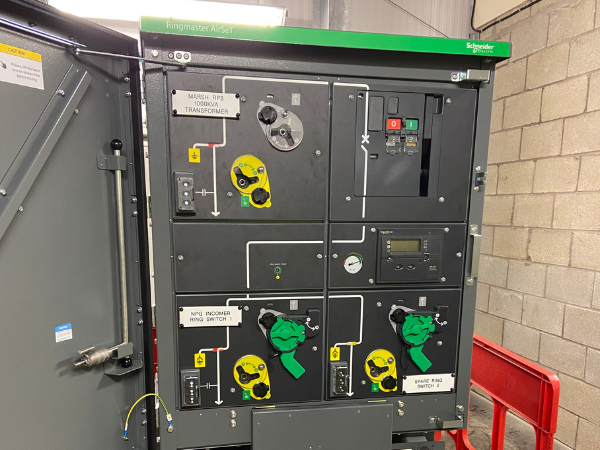In Scotland IUS has delivered a Battery Energy Storage System (BESS), which impressed Michał Kuciński of Tesla. "I want to acknowledge the outstanding work that the IUS team has been consistently delivering at the Little Raith site over the past few months. Certainly, from my side, it feels like Tesla and IUS developed a partnership with a common goal of completing our BESS project on time, in the best possible quality. The team that I’m working with on day-to-day basis is of utmost help, impresses with professionalism, puts attention to small but important details and represents a united front with Tesla. I would like to express my sincere gratitude to the entire IUS team involved.”
For enquiries or quotes 0800 073 73 73 [email protected]
For enquiries or quotes 0800 073 73 73
[email protected]
Slavery Statement
This Statement has been published in accordance with section 54(1) of the Modern Slavery Act 2015. It sets out the steps taken by Northern Powergrid Holdings Company and its subsidiaries (the “Group”) during the year ending 31 December 2024 to prevent modern slavery and human trafficking in its business and supply chains. The Group companies covered by this Statement are detailed in Annex 1.
Organisation structure
The core business activity of the Group is the distribution of electricity in the North East of England, Yorkshire and Northern Lincolnshire by its subsidiary companies Northern Powergrid (Northeast) plc and Northern Powergrid (Yorkshire) plc, both of which are authorised distributors under the Electricity Act 1989. Additional business activity is undertaken by Northern Powergrid Metering Limited, which is a provider of conventional and smart meter assets, Integrated Utility Services Limited (UK and Ireland), which provide engineering contracting services and CalEnergy Resources Limited which holds interests in Australia and the United Kingdom. The Group’s primary value chain is located in the United Kingdom and internationally for the provision of both goods and services and secondary value chain is located primarily in the United Kingdom. At 31 December 2024 the Group had over 3,015 employees, mainly in the UK.
Policy in relation to slavery and human trafficking
The Group (which is owned by Berkshire Hathaway Energy (“BHE”)) has adopted the BHE Core Principles and BHE Code of Business Conduct. The Core Principles define the Group’s values and vision and acts as the framework by which the Group holds itself accountable. The Core Principle of ‘Regulatory Integrity’ underpins the Group’s commitment to comply with all laws wherever it does business and the expectation that all employees manage their activities in a manner that is compliant with all laws, rules, regulations and corporate policies. The BHE Code of Conduct requires adherence to the highest level of ethical conduct and fair dealings with all customers, suppliers and competitors.
Assessment and management of risk
The Group has established the following measures in order to reduce the risk of slavery and human trafficking taking place in its business or supply chain:
Due diligence processes and policies
A policy has been developed and implemented for the recruitment and selection of employees to ensure that all persons employed by or engaged to provide services for the Group are suitable for appointment, appropriately qualified and can be lawfully employed. Consequently, all aspects of employment are carried out in accordance with current employment and other relevant legislation. The policy applies to all potential employees of the Group, including those who are employed by a third-party agency and is regularly reviewed and updated. Where the Group engages agencies to provide services, it must be satisfied that the service provider has in place similar and effective policies and procedures;
Employees are treated with respect and the Group believes that it should recognise and reward employees appropriately as they work towards meeting its business’ goals. Terms and conditions of employment have been developed and implemented in order to meet both individual and business needs. Employees are covered either by collective bargaining arrangements, which are only changed through an official consultation and/or negotiation process with the appropriate recognised Trade Union, or by personal contracts, which are agreed with the relevant individual on a personal basis;
A "speaking up" policy is in place so that members of staff are able to raise any instances of unethical acts, malpractice or impropriety, including a breach of modern slavery legislation, with line or senior management or via an international, anonymous help line operated by an independent company;
The procurement policy establishes the standard to ensure that all procurement activities are carried out professionally, ethically and in compliance with all laws and legislative requirements. The policy also takes into consideration the commitment to safety, the environment and the principle of total quality. The policy is aligned to the BHE’s Global Procurement Office framework;
Managing supply chain risks
To ensure all those in the Group’s supply chain and contractors comply with the Group’s values and ethics, a rigorous supply chain compliance programme is in place. A supplier registration system is used for the majority of the goods and services the Group procures. The system, operated by Achilles Information, is known as the Utilities Vendor Database (the “UVDB”) and includes pre-qualification questions that suppliers are required to answer as part of the UVDB registration process regarding their approach to slavery and human trafficking. Those questions include whether the suppliers have published a statement on the prevention of slavery and human trafficking within their organisations. In the event that a supplier has not met the requirement to publish such a statement, it may lead to exclusion of that supplier from the process. The system also includes an annual verification process for high-risk requirements, which may result in site audits of the suppliers concerned, and, as part of which, any issues identified as being associated with the supplier’s compliance with the Modern Slavery Act 2015 would be addressed;
The Group’s standard terms and conditions contain clauses which oblige a supplier of goods to comply with all regulations relating to the manufacture, labelling, packaging, storage, handling and delivery of the goods. Suppliers of services are required to provide services in accordance with good industry practice and all applicable laws, all legislation, and all rules or regulations of any kind, including all related official guidance including codes of practice; and
Training
To ensure a high level of understanding of the risks of modern slavery and human trafficking in the Group’s supply chain and business, regular training is provided to all employees. All employees are required to complete annual training on the Code of Business Conduct, which includes a section on obligations to non-employees and the expectation to not take advantage of anyone through any unfair practice. In addition, the training reinforces that each employee is responsible for compliance with the Code of Business Conduct, all appliable laws, company policy and for raising any concerns. A training session on the Modern Slavery Act 2015 has been provided to specific employees in management and senior management positions, including in Human Resources and Procurement.
Monitoring and evaluation
The effectiveness of the measures implemented to reduce the risk of slavery and human trafficking taking place in its business or supply chain are monitored and evaluated on a continual basis.
The current measures implemented to prevent modern slavery and human trafficking continue to be effective in mitigating the risks in the Group’s business and supply chains.
This Statement was approved by the board of Northern Powergrid Holdings Company on 17 April 2025 in respect of the year ended 31 December 2024 and applies to the Northern Powergrid companies detailed in Annex 1. Where relevant, this Statement will be updated on an annual basis.
Phil A Jones
President and Chief Executive Officer 17 April 2025
Annex 1.
Northern Powergrid (Yorkshire) plc Northern Powergrid (Northeast) plc Integrated Utility Services Limited
Northern Powergrid Metering Limited
CalEnergy Resources (UK) Limited
Careers in IUS
IUS News



Johnathan Ridsdale from Portakabin has sent IUS positive feedback. "Many thanks for the excellent emergency response and work carried out on our High Voltage cable fault. Special thanks for going above and beyond in urgently attending the site, making it safe, and staying with us to find the fault. Thank you for putting plans in place to bring plant and a workforce to the site, in order to excavate the cable and restore power."
Nissan utilise IUS for both substation construction and maintenance at their car manufacturing plant in Sunderland. Ian McClelland, a Nissan Electrical Engineer, has thanked the IUS team for all of the support provided to assist the operation of their plant, which is critical to production.
IUS design, procure and construct contestable connections including at the University of Leeds. Simon Gough, Head of Engineering Services sent his appreciation to IUS for the assistance with a Northern Powergrid 33kV connection application, associated with a new primary substation.
ESP Utilities Group are an Independent Distribution Network Operator and IUS deliver contestable connections to their adoptable standards. Following a recent connection, Adrian White an Operations Engineer at ESP commented, “May I congratulate you all for the build and care taken at the substation, very well done.”
Persimmon Homes thanked the IUS Multi Utility team for their good performance in recent months and on the Garforth and Skelmanthorpe schemes in particular. These are challenging developments and Samuel Sowery the Technical Director recognised that, “IUS have gone above and beyond to complete the works.”
WGM have recognised an outstanding level of service provided by IUS at Dalmarnock Wastewater Treatment Works. Scott Gallagher, a WGM Senior Contracts Manager, paid tribute to the performance of the IUS team, stating “I was delighted with the professionalism, flexibility and technical expertise, when assisting WGM in restoring essential supplies to the site.”
CMDP engaged with IUS to deliver the power to a new Water Treatment Works for Southern Water at Burham Water. Following a shutdown, Neil Cuthbert of CDMP commented, "Sounds like an amazing effort by all to achieve this milestone, which will provide the site resilience. Just goes to show what can be done by a great team of committed professionals."
IUS has delivered a number of prestigious projects for BELCO in Bermuda, including the 22kV substations and 4kV substations associated with the new International Airport. The client’s representative, Jonathan Pedro praised IUS for delivering the project on time and to budget, with no health and safety related incidents.
IUS delivers a number of frameworks for Northern Powergrid including secondary SCADA. The Northern Powergrid Delivery Engineer, Jamie Braithwaite said, "I've found the IUS team to be professional, customer focused and ready to help support the SCADA project at all times. They manage their teams and the wider IUS resources very well. I look forward to continuing to work with the team into ED2. Great job!"

